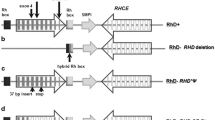Abstract
The aim of this research was to demonstrate: The specificity, sensitivity, the positive and negative prediction value of the PCR method in the detection of the fetal RhD status from maternal blood in various weeks of gestation. Which was the earliest gestational week, when is possible to get a reliable result? How did the presence of RhD antibodies in sensitized mothers affect the results? This was a prospective clinical study within a multidisciplinary project approved by the Ministry of Science of the Republic of Serbia, 2011. The study was approved by the Ethics Committee of the Medical Faculty in Belgrade. Ninety six RhD negative patients had participated in the study, with written consent. The sensitivity of the determination of the RhD status of the fetus from the mother’s blood after the 7th GW in our sample was 98.6%, with a specificity of 92%. The positive predictive value of the test was 97% and the negative predictive value was 95.6%. False positive results were detected in 2.6% of cases and 4.5% of cases were false negative. This is a reliable test which should be used in monitoring of pregnancies of RhD negative mothers.
Similar content being viewed by others
References
Banch Clausen F, Steffensen R, Christiansen M et al (2014) Routine noninvasive prenatal screening for fetal RHD in plasma of RhD-negative pregnant women—2 years of screening experience from Denmark. Prenat Diagn 34:1000–1010
Van den Veyver IB, Moise KJ Jr (1996) Fetal RhD typing by polymerase chain reaction in pregnancies complicated by rhesus alloimmunization. Obstet Gynecol 88(6):1061–1067
Minon JM, Gerard C, Senterre JM, Schaaps JP, Foidart JM (2008) Routine fetal RHD genotyping with maternal plasma: a four-year experience in Belgium. Transfusion 48(2):373–381
Tynan JA, Angkachatchal V, Echrich M et al (2011) Multiplex analysis od circulating free nucleic acids for noninvasive prenatal diagnostic RhD testing. Am J Obstet Gynecol 204(251e):1–6
Geifmann-Holtzman O, Grotegut CA, Gaughan JP (2006) Diagnostic accuracy of noninvasive fetal Rh genotyping from maternal blood—a meta analysis. AJOG 195:1163–1173
Lo YM, Chiu RW, Chan KC, Chung GT (2004) Free fetal DNA in maternal circulation. JAMA 292(23):2835 (author reply 2835-6)
Wikman AT, Tiblad E, Westgren M (2012) Noninvasive prenatal screening for RHD: the Stockholm study. ISBT Sci Ser 7:168–172
Chitty LS, Fining C, A Wadesenior et al (2014) Diagnostic accuracy of routine antenatal determination of fetal RHD status across gestation: population based cohort study. BMJ 349:5243
Akolekar R, Finning K, Kuppusamy R, Daniels G, Nicolaides KH (2011) Fetal RHD genotyping in maternal plasma at 11–13 weeks of gestation. Fetal Diagn Ther 29:301–306
Bombard AT, Akolekar R, Farkas DH, VanAgtmael AL et al (2011) Fetal RHD genotype detection from circulating cell-free fetal DNA in maternal plasma in non-sensitized RhD negative women. Prenat Diagn 31:802–808
Brojer E, Żupanska B, Guz K, Orziñska A, Kaliñska A (2005) Noninvasive determination of fetal RHD status by examination of cell-free DNA in maternal plasma. Transfusion 45:1474–1480
Author information
Authors and Affiliations
Corresponding author
Ethics declarations
Conflict of interest
The authors declare that they have no conflict of interest.
Ethical Approval
All procedures performed in studies involving human participants were in accordance with the ethical standards of the institutional and/or national research committee and with the 1964 Helsinki declaration and its later amendments or comparable ethical standards.
Rights and permissions
About this article
Cite this article
Plešinac, S., Plećaš, D. & Babović, I. The Determination of Fetal RhD Status from Maternal Blood in Serbia. Indian J Hematol Blood Transfus 34, 486–490 (2018). https://doi.org/10.1007/s12288-018-0919-z
Received:
Accepted:
Published:
Issue Date:
DOI: https://doi.org/10.1007/s12288-018-0919-z




